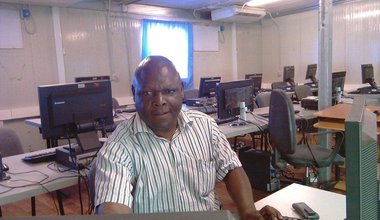Maxwell Mandere: The story of a Malawian refugee to become a UN volunteer
While Maxwell sits to have coffee and talk to us in the UNAMID compound, in El Fasher, one hears all sort of resounding greetings and friendly slaps on the back can be heard every now and then, accompanied by references as “my brother” in both Swahili and English. As a very dear member of the UNAMID community and an IT Help Desk Assistant Maxwell has been able to help a lot of us to fulfill our tasks.
Born in Malawi, his commitment to humanitarian causes it’s been with him since he can remember. Once a refugee himself in Zambia, Maxwell can talk about what war and conflict unleash onto children and how families struggle to keep the faith while their whole life changes.
As a student in Zambia, Maxwell was always interested in science and this is why he enrolled at the Institute of Science and Technology to start a career as a chemical engineer; however, due to political reasons as a Malawian refugee in the Zambia he could not finish his studies and was sent to Tanzania first and then to Bulgaria to finally pursue a degree in agricultural economics. He graduated with a Master‘s Degree.
Back in Tanzania, he started working for the Ministry of Agriculture and there made his first approach to the information technology world. There was a pool of four PCs which personnel used to write reports. Many of them did not know how to use the equipment and this is how Maxwell started his activities as a volunteer, helping to guide the colleagues on how to use these computers. Mind you, these were the days of MS DOS and Word Perfect!
During this time he also discovered another passion: teaching. That is why when a friend told him about a computer instruction centre, where he could help more people on how to use the new technologies, he didn’t hesitate to take this up as a part time activity.

The centre became very popular and enrolment rose sharply. Among the centre clients was the WFP country office in Tanzania, which used this service to maintain their hardware and also to train some of their staff members. Being an outstanding trainer and technician, Maxwell was called by the WFP country director, who decided to employ him as an IT assistant. Despite the dismay this caused to the Computer Centre’s director, Maxwell took the WFP offer and worked for them from 1996 to 2002. After completing a diploma in Computer Science at the University of Dar es Salam, there was a change in the political situation back in Malawi, and Max decided to return home.
Once in Malawi, Maxwell was offered a job in the WFP Country Office, also as an IT assistant, where he stayed up to 2008; in the meantime, he was also doing some peer support as a volunteer on HIV and AIDS for the same office. He received the proper training and was very satisfied with the results of the programme; although while been in Darfur he has come to know that some of the individuals he supported passed away.
On 2008, the UNV Programme offered Maxwell an assignment as an IT Assistant Help Desk for UNAMID. “I am proud of what I do,” remarks Maxwell and judging by the reactions of his customers (UNAMID personnel in Super Camp) the demand for his assistance has never decreased; since the establishment of a tracking system in the CITS Help Desk in January 2010, Max –as he is commonly known by his peers has handled 2,240 cases, not including the work carried out at UNAMID team sites or special assignments to support the UNAMID liaison office in Addis Ababa, Ethiopia.
At the age of 50, Max states that after being a UN volunteer he can say the following three things to his grandchildren in 20 years time: “working in Darfur exposed me to very diverse cultures and made it possible for me to relate to individuals representing these cultures. As a Service Desk Assistant I interacted on a daily basis with many people. Although my role did not allow me to interact directly with Darfuris, being able to relate to the challenges these people face at first hand had the potential to drive me to achieve bigger results.”
By Omar Jallow & Natalia Herrera Eslava
 UN
UN United Nations Peacekeeping
United Nations Peacekeeping





